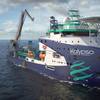The Civil Works budget proposed by the Bush Administration represents a 14 percent decrease from last year and falls far short of meeting the nation's water resources infrastructure needs, said the American Association of Port Authorities (AAPA).
The budget outline released on February 28 would decrease the U.S. Army Corps of Engineers (Corps) Civil Works Budget to $3.9 billion. Last year Congress appropriated $4.54 billion, which still fell short of demand for water infrastructure improvements. Over the last five years, the Corps budget has not even kept pace with inflation.
"While we are pleased the budget proposes to give priority to projects and programs with significant national benefits, including commercial navigation, there is still a serious shortfall in funds available to address the nation's water resources needs," said Kurt J. Nagle, AAPA president.
Although the Administration will not release funding levels for specific projects until April, the budget outline notes that the final proposed budget: a) will decrease funding for studying potential new projects; b) not fund new construction project starts; and, c) will significantly cut back or provide no funding for many new projects appropriated by Congress in FY 2001. The cutback on future development was proposed as a way to address the nearly $40 billion backlog on construction of active projects.
The decrease comes at the same time that international trade is projected to at least double by 2020. Federal navigation channels, which are constructed and maintained by the Corps of Engineers in partnership with local port authorities, are vital components of the transportation infrastructure, handling 95% of U.S. international trade.
Ports strongly oppose this policy direction. A "no new starts policy" was considered and rejected by Congress last year. Rather that cut the budget and further delay critically needed improvements, AAPA urges a significant increase in the Corps of Engineers FY 2002 budget to $6.0 billion. A decrease in the budget with no new starts will make the backlog worse. Providing no money for new starts and decreasing funding for ongoing
projects puts more pressure on future budgets as other projects that are ready to be constructed begin competing for funds. A failure to fund new starts also disrupts the Federal/state/local construction process, forestalls the realization of benefits, raises project costs, and extends development beyond important deadlines. The United States must not fall behind as other nations modernize their national transportation systems to compete in international markets.
International trade has become increasingly important to U.S. economic growth. Foreign trade as a percentage of U.S. Gross Domestic Product (GDP) has risen consistently, and currently accounts for over one fourth of GDP. Projections are that trade growth, in the next few years, will be significantly higher than GDP growth.
Sponsored Content
Chris-Marine’s solutions help to prolong engine lifetime

AST is now AST Networks, bringing you remote connectivity wherever you are

March 2024
 Read the Magazine
Read the Magazine

 Read the Magazine
Read the Magazine
This issue sponsored by:

Inland Waterways Focus: The Pacific Northwest Columbia-Snake River System
March 2024
 Read the Magazine
Read the Magazine

 Read the Magazine
Read the Magazine
This issue sponsored by:

GAO: Coast Guard Should Better Monitor its Efforts to Credential Merchant Mariners
Subscribe for
Maritime Reporter E-News
Maritime Reporter E-News is the maritime industry's largest circulation and most authoritative ENews Service, delivered to your Email five times per week










